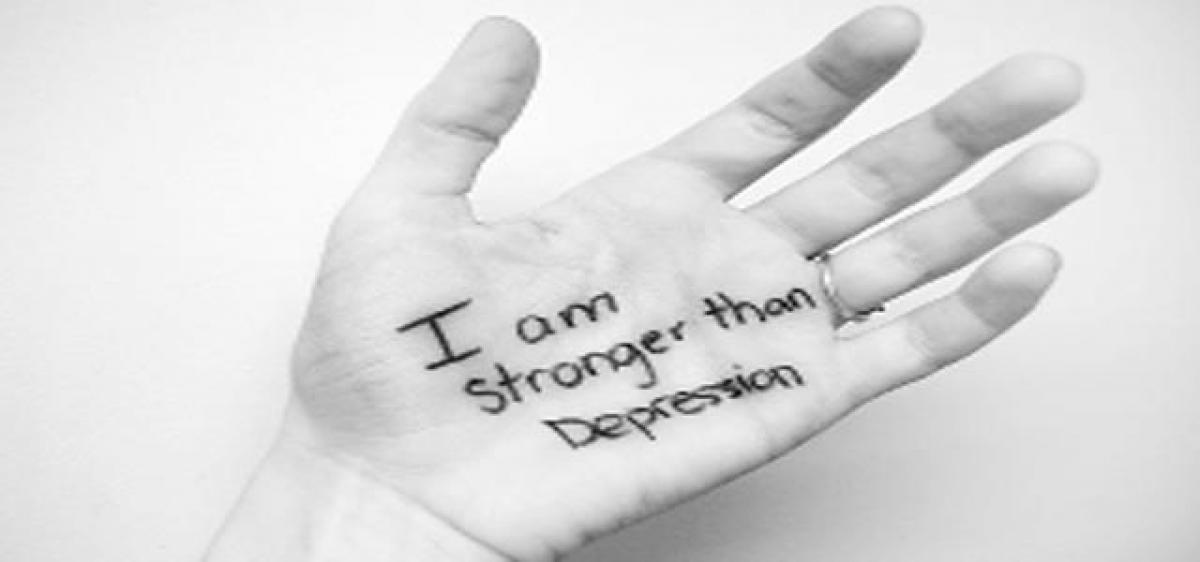Live
- One nation, one election need of the hour: Mukhtar Abbas Naqvi
- Educational Trips in South Kanara Put on Hold Following Murudeshwar Drowning Incident
- Karnataka Temple Embraces Mechanical Elephant for Cruelty-Free Ceremonies
- Temple modelled after Ram Mandir to be constructed in US
- Property dealer shot dead in broad daylight in Ranchi
- Maharashtra: CM Fadnavis expands Cabinet; inducts 39 ministers
- Winter Session of UP Assembly from Dec 16; CM seeks cooperation of all parties
- AIADMK executive council meet passes sixteen resolutions, vows to make Edappadi CM again
- Manchu Family Feud Resurfaces in Jalpally
- Kerala Hindu leader gifts Rig Veda to Pope Francis
Just In

Depression means different things to different people; it can affect a person’s thoughts, behavior, feeling and sense of wellbeing. According to the World Health Organization (WHO), it is one of the highest contributors to disability adjusted life years in the world.
Depression means different things to different people; it can affect a person’s thoughts, behavior, feeling and sense of wellbeing. According to the World Health Organization (WHO), it is one of the highest contributors to disability adjusted life years in the world.
In medical parlance, depression is referred as an illness that is characterised by continuous sadness, associated with disinterest in activities, excessive fatigue, guilt, hopelessness and disturbances in normal biological functions like sleep, appetite and weight. It is said that depression is a universally prevalent condition, irrespective of the factors contributing to it.
Senior consultant psychiatrist, Dr D Venugopal from Citizens Hospital said, “Depression means anything between ‘sadness’ in layman terminology and ‘major depression’ as diagnosed by psychiatrists. Depressed patients often nurse negative views about themselves, their future and world around them.
Severely depressed patients also have suicidal thoughts and may even try to act on the same. Having said that, not all depressed patients are alike in their symptoms and overall profiles differ from each other. This also means that the same treatment approach may not be effective for every patient in same way.”
Dr Venugopal said that depression can affect people of all ages starting from children to elderly people. Women are reported to have a higher prevalence of the disease, as are people with physical illnesses and adverse social circumstances.
Stressful life events often precipitate full blown depression in vulnerable people. “Many patients often from a rural background present with physical (somatic) complaints and anxiety symptoms, which are not fully explained by an underlying medical cause,” he added.
Depression is certainly a treatable illness. It is important to undertake a comprehensive assessment of the disease, patient engagement and compliance is crucial to the success of any treatment, and given this, the majority of patients improve.
“I have worked with research teams in India and abroad, and have co-authored over a dozen academic publications in national and international journals, such as Telangana Journal of Psychiatry, Australasian Psychiatry, Psychopathology and many more.
I have been a consultant psychiatrist and a medical educator, held positions of responsibility in the NHS, the Northwestern Deanery, and Manchester Medical School.
I have been mainly providing Outpatient clinic based care in Hyderabad, but have also continued to be involved in training and supervising postgraduate students (DNB) in psychiatry. Maintaining the track-record of planning and setting up high quality mental health services since returning to India has been a challenge,” concludes Dr D Venugopal.
By Aneri Shah

© 2024 Hyderabad Media House Limited/The Hans India. All rights reserved. Powered by hocalwire.com







